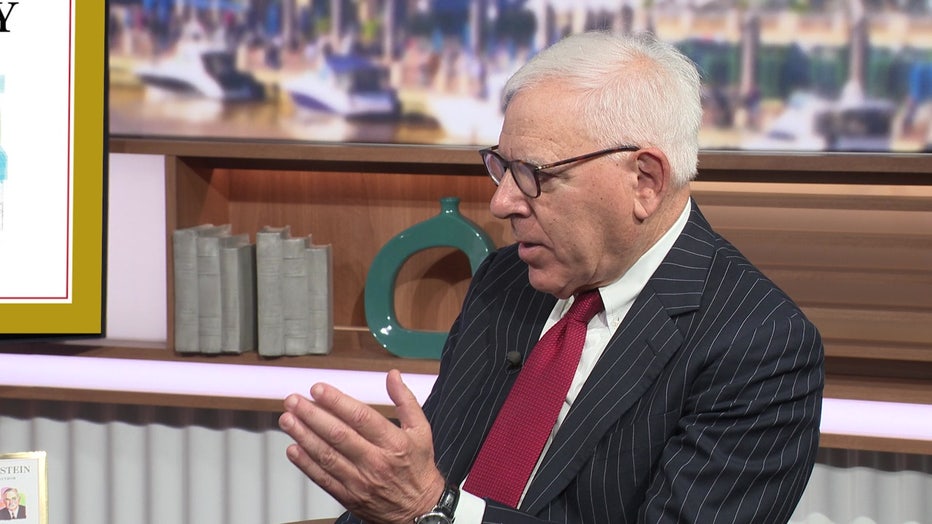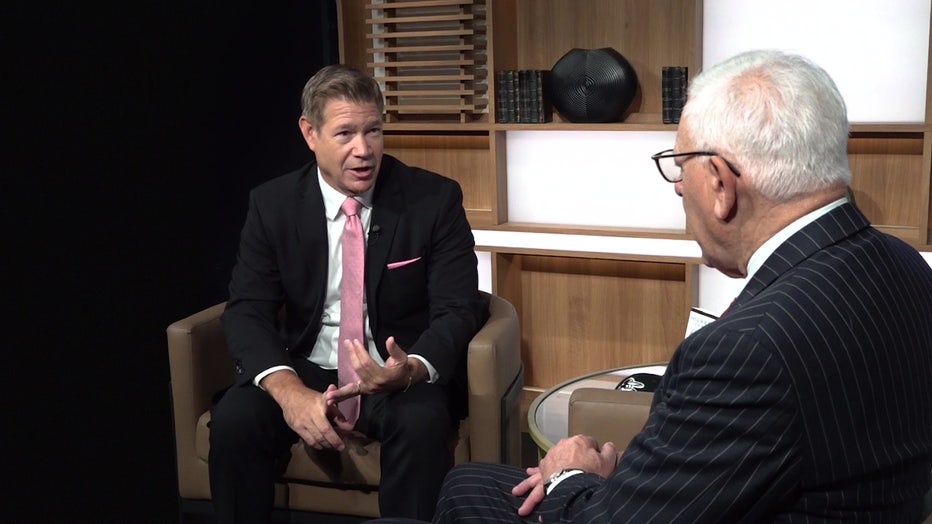David Rubenstein’s new book, “The Highest Calling," offers insights into presidential history
WASHINGTON - David Rubenstein is well known as the founder of the Carlyle Group, for giving millions of dollars to repair, maintain, and improve D.C. landmarks like the Washington Monument, and most recently, is the new owner of the Baltimore Orioles.

One-on-one with David Rubenstein
David Rubenstein joined Fox 5 DC's Steve Chenevey to talk about his newest book "The Highest Calling" that will be on sale this month.
But the billionaire philanthropist is also an author. His new book is about the American presidency. It's called "The Highest Calling," and it includes some of the interviews that Rubenstein conducted with current and former U.S. presidents.
FOX 5’s Steve Chenevey spoke with him about what he hopes people will take away from this view of presidential history.
Steve Chenevey: I think that it's a nice mixture of the message you're trying to get out, like you said, go out and vote, but also, we're learning details about which presidents may have been effective, which ones were not, what might have been forgotten over history.
David Rubenstein: Well, what I try to do is interview scholars about presidents like Washington and Jefferson and Lincoln, but also interview current president, people who have been president, who are still living. And I had a mix of that, and then I had my own perspectives on what it's like to work in the White House. I'm from Baltimore. I was 27 years old working in the White House in the West Wing. I didn't think I'd ever have that opportunity, but I did, and it's a great experience, and it's something I encourage other people if they have a chance to do, which is to work in government, and work in public service, and work in the White House, if a chance arises.

David Rubenstein’s talks new book, philanthropic efforts, ownership of the Baltimore Orioles
FOX 5’s Steve Chenevey's full interview with David Rubenstein on his new book, philanthropic efforts, and ownership of the Baltimore Orioles.

David Rubenstein’s new book, "The Highest Calling," offers insights into presidential history
SC: Because you had that unique experience of being able to talk to living presidents, being able to talk to scholars who have studied and researched and written books on other presidents. For you when you were putting this together, what rang a little more true for you? The people you were able to talk to directly, or the information you learned from others.
DR: Well, when you talk to a president directly, they're obviously not going to probably say everything that they might really think, because they obviously have a certain public image. But I think the interviews are pretty transparent and they are pretty frank in many ways. When you're talking to scholars, scholars are talking about presidents who are long gone, and when a president is long gone, you can learn more about them by going through their papers. It is said that it takes about 40 years after somebody's president to really get a real view of what that president was like. But I think it's a mix, and what I hope people will get out of the book is a feeling about the importance of the presidency. I call it "The Highest Calling" because, as you were referring earlier, I have, tongue in cheek, said for years, the highest calling is private equity, which obviously it's not. But the highest calling really is serving our country and serving the world. And the person who serves as president of the United States is really probably the most important person in the Western world, if not the world. When you think about it, we have six or seven billion people on the face of the earth. Who is the most important person? At any given time it's probably the President of the United States. And that's why I think people should learn more about our presidents.
SC: I'm curious, from your perspective - and you mentioned being 27-years-old, being able to work at the White House. Going into that you probably thought, and through your education, that you knew quite a bit about what it was like to be at the White House, or what it was like for somebody to be president. What did you learn from that experience - being there - that was just completely different from what you thought it would be.

David Rubenstein’s new book, "The Highest Calling," offers insights into presidential history
DR: I learned how little I knew really, because I was only 27-years-old, three years out of law school. I had worked in New York City as a lawyer for Ted Sorensen, who had been John Kennedy's great speechwriter. But I really didn't learn that much about the White House from him. We were doing other things. I learned how little I knew at 27, so I wish I had the energy that I had then, and I could go back with the mind and knowledge I have now and do it again, because I'm now much older, 50 years older than I was then, almost. And I just wish I had the knowledge then that I have now. I didn't know that much, but, you know, that's the way White Houses often are. You have young people who work in campaigns, and they get to work in the White House. You have more experienced people. But in the end, White Houses are often filled by people in their 20s and 30s.
SC: It's one of the things that I thought was a big shock to me when I first moved to D.C. I didn't realize that. I think, like most people, I thought that, you know, maybe you see, you obviously see the president, maybe you see a chief of staff, and you see people who might be a little bit older. And then you come here, and you realize that the bulk of the staff is quite young.
DR: People are young. For example, when I worked on Capitol Hill briefly, before I went to the White House, I said, ‘We don't really know what we're doing exactly, but we'll send it downtown. These people are experienced.’ When I went to work the White House, I said, ‘We don't really know what we're doing, we'll send it up to Capitol Hill. They're experienced, and eventually somebody will figure this thing out.’ The truth is, nobody knows on either end of Pennsylvania Avenue what really they should be doing.
"The Highest Calling" is officially out Tuesday, September 10.

David Rubenstein’s new book, "The Highest Calling," offers insights into presidential history

